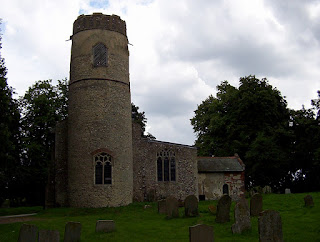Last week I mentioned that this post would be about Cross Street, which I decided to incorporate with my topic about Bungay for the letter B. Cross Street was where my mother lived during the 1960s with her parents and siblings. They lived in the biggest house in Cross Street, and they ran the tearooms at 6 Cross Street.
Cast your mind back to the 1960s. It was a heady time for the youth, with popular music and fashion being at the forefront of most young people's minds. Where would you go in a small market town where you could get together with your friends? And, what about the older generation who didn't want all that noisy parlava? They went to Alfo's Cafe in Cross Street.
There you could get a decent, greasy fry-up meal all day (and sometimes very late at night if you were a passing lorry driver). And bottomless cups of tea. If you went to Alfo's in the 1960s, chances are you were served by a member of the Preston family.
 |
| Alfo's circa 1966 |
 |
Back of Alfo's in 1966
Man on far left: My godfather, Tony MooreSecond from left: My grandmother Lilian Boy in front with football, my uncle Raymond Young man with cup and saucer, my uncle Malcolm |
The Tearooms have changed hands many times over the years, and during family visits back to England various photographs have been taken of what was once the family business, albeit for a short time. I believe it was listed in August 1972 as a Grade II Listed Building. Later known as The Buttercross Tearooms, its namesake cleverly taken from the famous buttercross in the Market Square around the corner, it looks like this:
For an interesting blog review of Cross Street Tearooms, see the Fry Up Inspector.
During the 1960s my mother and family lived in the big house in Cross Street. This early nineteenth century, three storey, limewashed brick house is also a Grade II Listed Building (listed in August 1972). The house is situated directly opposite the Buttercross Tearooms (once Alfo's). Conveniently, not too far to walk from home to work. :-)
Next door to the house were a block of public conveniences, the gents entrance being closer to the house. My mother and aunt still love to giggle as they recount the story of times spent together, hanging out of the first floor window calling out, "We know what you're doing!" to unsuspecting members of the public.
History of Cross Street
Cross Street had two publichouses in the nineteenth century - The Crown Inn and The Jolly Butchers, the latter of which was run by James & Susannah Laws.
Until 1930 Cross Street was home of the Bungay Fire Engine Station (This was situated next door to the Cross Street house). In 1889 a fire engine was purchased by subscription at a cost of £187 15s. The town reeve contributed £50 to the total cost. In 1892 John Howlett was Captain and had eight men.
In 1904 a fire escape was provided. The 1912 Kelly's Directory describes the Cross Street Fire Engine Station as a plant consisting of 3 manuals, and 1 fire escape. William Richards Norman (victualler of the nearby Fleece Hotel) was the Captain and had fourteen men.
In December 1930 the new Fire Engine Station was opened in Lower Olland Street and by 1937 was equipped with a steam fire engine, a 35 h.p. Daimler tender, 2 manuals and a fire escape. James W Jeffries was Captain.
The site of the old Fire Engine Station in Cross Street was converted and extended by Wightman's Drapery & Furniture store but suffered severe bomb damage shortly after completion, during the Second World War.
Acknowledgements: Chris & Terry Reeve of Bungay
All photographs from my private collection
All photographs from my private collection


















